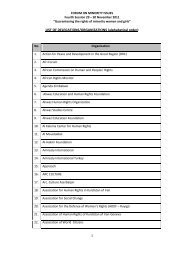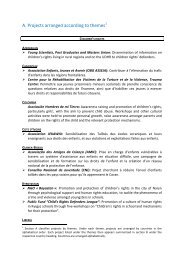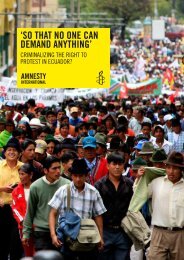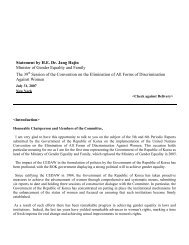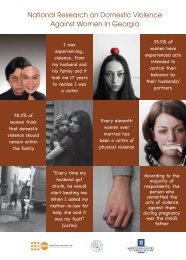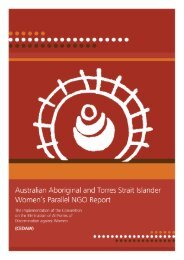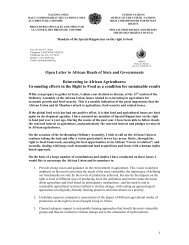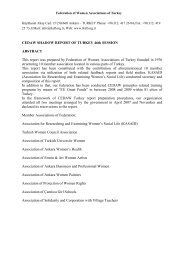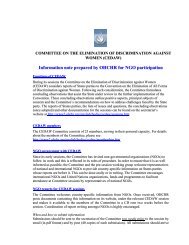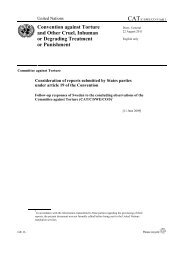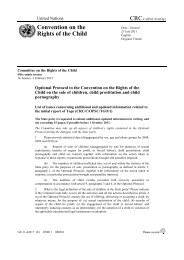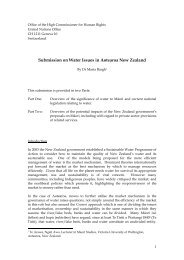Report - Office of the High Commissioner on Human Rights
Report - Office of the High Commissioner on Human Rights
Report - Office of the High Commissioner on Human Rights
- No tags were found...
Create successful ePaper yourself
Turn your PDF publications into a flip-book with our unique Google optimized e-Paper software.
<str<strong>on</strong>g>of</str<strong>on</strong>g> <str<strong>on</strong>g>the</str<strong>on</strong>g> right to adequate housing and land. Excerpts <str<strong>on</strong>g>of</str<strong>on</strong>g> <str<strong>on</strong>g>the</str<strong>on</strong>g> testim<strong>on</strong>ies, <str<strong>on</strong>g>the</str<strong>on</strong>g> key issues and obstacles<br />
identified in <str<strong>on</strong>g>the</str<strong>on</strong>g> testim<strong>on</strong>ies, and <str<strong>on</strong>g>the</str<strong>on</strong>g> corresp<strong>on</strong>ding recommendati<strong>on</strong>s to Pacific Island States are<br />
outlined below.<br />
3.1 Violence Against Women<br />
3.1.1 Domestic violence<br />
“I am a victim <str<strong>on</strong>g>of</str<strong>on</strong>g> domestic violence, my mo<str<strong>on</strong>g>the</str<strong>on</strong>g>r was a victim <str<strong>on</strong>g>of</str<strong>on</strong>g> domestic violence, and<br />
I was raised in a family o<str<strong>on</strong>g>the</str<strong>on</strong>g>r than my own because <str<strong>on</strong>g>of</str<strong>on</strong>g> <str<strong>on</strong>g>the</str<strong>on</strong>g> domestic violence. This is<br />
a pers<strong>on</strong>al story <str<strong>on</strong>g>of</str<strong>on</strong>g> my mo<str<strong>on</strong>g>the</str<strong>on</strong>g>r, who was beaten up by my fa<str<strong>on</strong>g>the</str<strong>on</strong>g>r during his alcohol rages,<br />
for not cleaning <str<strong>on</strong>g>the</str<strong>on</strong>g> house as he expected.<br />
When we were growing up we always knew what mood my fa<str<strong>on</strong>g>the</str<strong>on</strong>g>r was in and when to<br />
leave <str<strong>on</strong>g>the</str<strong>on</strong>g> house. When he was violent my mo<str<strong>on</strong>g>the</str<strong>on</strong>g>r would take us and run to an Aunty’s<br />
house. Due to <str<strong>on</strong>g>the</str<strong>on</strong>g> violence she left my fa<str<strong>on</strong>g>the</str<strong>on</strong>g>r and returned to her home <strong>on</strong> <str<strong>on</strong>g>the</str<strong>on</strong>g> outer<br />
island. She lost her job and couldn’t take all three children. So she left me behind with<br />
ano<str<strong>on</strong>g>the</str<strong>on</strong>g>r family, who were also struggling <strong>on</strong> <strong>on</strong>e income. Her bro<str<strong>on</strong>g>the</str<strong>on</strong>g>r allocated her some<br />
land but it was far away and had no access to electricity. She had to build <str<strong>on</strong>g>the</str<strong>on</strong>g> house,<br />
clear <str<strong>on</strong>g>the</str<strong>on</strong>g> land (working by kerosene light) and buy <str<strong>on</strong>g>the</str<strong>on</strong>g> kerosene. My sisters say I had<br />
<str<strong>on</strong>g>the</str<strong>on</strong>g> easier life because I lived in <str<strong>on</strong>g>the</str<strong>on</strong>g> city with tap water.<br />
Now I work <strong>on</strong> making sure that this doesn’t c<strong>on</strong>tinue to happen with my daughters and<br />
my sister’s daughters.” (Cook Islands)<br />
Domestic violence can be physical, verbal, emoti<strong>on</strong>al and even ec<strong>on</strong>omical (e.g. c<strong>on</strong>trolling household<br />
finances). Research undertaken by Fiji Women’s Crisis Centre (FWCC) in 2001 shows that at least 66%<br />
<str<strong>on</strong>g>of</str<strong>on</strong>g> women reported being beaten up by <str<strong>on</strong>g>the</str<strong>on</strong>g>ir husbands, and 3 out <str<strong>on</strong>g>of</str<strong>on</strong>g> 10 <strong>on</strong> a repeated basis. FWCC<br />
deals with 1000-1500 clients per year, who are mostly women with a history <str<strong>on</strong>g>of</str<strong>on</strong>g> violence in <str<strong>on</strong>g>the</str<strong>on</strong>g>ir lives.<br />
For many women experiencing domestic violence, <str<strong>on</strong>g>the</str<strong>on</strong>g> <strong>on</strong>ly opti<strong>on</strong> is to leave <str<strong>on</strong>g>the</str<strong>on</strong>g>ir home. Even if women<br />
are joint owners/tenants or even sole owners/tenants, and have secure tenure, many women still feel<br />
<str<strong>on</strong>g>the</str<strong>on</strong>g> <strong>on</strong>ly available opti<strong>on</strong> is to leave <str<strong>on</strong>g>the</str<strong>on</strong>g>ir home to escape violence. This leaves many women and <str<strong>on</strong>g>the</str<strong>on</strong>g>ir<br />
children vulnerable to homelessness or to living in inadequate housing. The violence against a woman<br />
and her children can lead to violati<strong>on</strong>s <str<strong>on</strong>g>of</str<strong>on</strong>g> a range <str<strong>on</strong>g>of</str<strong>on</strong>g> o<str<strong>on</strong>g>the</str<strong>on</strong>g>r rights as well (i.e., restricting <str<strong>on</strong>g>the</str<strong>on</strong>g> right to<br />
work and opportunities for finance), which may in turn prevent women from being able to afford<br />
adequate housing when <str<strong>on</strong>g>the</str<strong>on</strong>g>y leave a home that is violent. Only 39% <str<strong>on</strong>g>of</str<strong>on</strong>g> Fijian women aged over fifteen<br />
years are in <str<strong>on</strong>g>the</str<strong>on</strong>g> labour force; 80% <str<strong>on</strong>g>of</str<strong>on</strong>g> women have no jobs or income. 15 The Governor <str<strong>on</strong>g>of</str<strong>on</strong>g> New Zealand’s<br />
Reserve Bank (using base figures from a study <strong>on</strong> family violence c<strong>on</strong>ducted in New Zealand) found<br />
that $97 milli<strong>on</strong> was <str<strong>on</strong>g>the</str<strong>on</strong>g> direct cost <str<strong>on</strong>g>of</str<strong>on</strong>g> domestic violence borne by victims and <str<strong>on</strong>g>the</str<strong>on</strong>g>ir families and that<br />
<str<strong>on</strong>g>the</str<strong>on</strong>g> New Zealand government spends $200 milli<strong>on</strong> <strong>on</strong> welfare, law enforcement and health care for<br />
victims <str<strong>on</strong>g>of</str<strong>on</strong>g> domestic violence.<br />
Customary, religious and cultural laws and practices that discriminate against women can reinforce<br />
women’s vulnerability to violence and associated violati<strong>on</strong>s <str<strong>on</strong>g>of</str<strong>on</strong>g> <str<strong>on</strong>g>the</str<strong>on</strong>g> right to adequate housing. For<br />
example, in T<strong>on</strong>ga women are not allowed to own land; in Fiji, women can own land but cannot access<br />
land for <str<strong>on</strong>g>the</str<strong>on</strong>g>ir use.<br />
15<br />
Statistics provided by Fiji Women’s Crisis Centre.<br />
22 WOMEN’S RIGHTS TO ADEQUATE HOUSEING AND LAND



